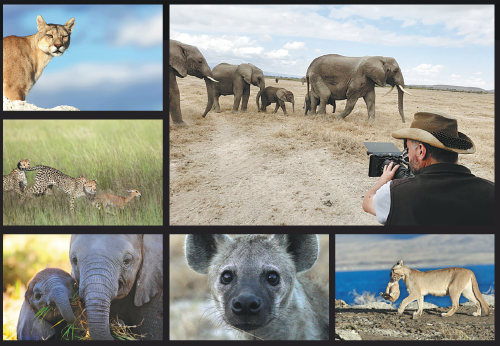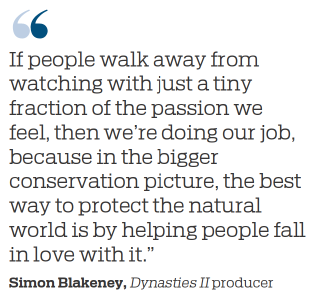A natural partnership
Chinese support for BBC wildlife documentary series 'vital' in helping spread conservation message, Julian Shea reports in London.
The producer of the latest big budget BBC natural history documentary series Dynasties II has praised the assistance of production partners such as China's BiliBili, saying that such partnerships are vital to getting these important films made and in spreading the message of the importance of wildlife conservation.
Dynasties II, which started streaming on BiliBili on May 28, is a sequel to the acclaimed 2018 series Dynasties, and across five episodes, focuses on the social interaction and lives of pumas, elephants, cheetahs, hyenas and macaques.
Even before the additional challenges raised by the pandemic, producing such a large-scale show was already demanding, and series producer Simon Blakeney tells China Daily that international support-and exposure-was vital to its success.
"The streaming revolution has caused a lot of disruption to how shows like this are made, so having the support of partners like BiliBili makes a huge difference, as we can focus on thinking about the animals," he says.
"What really amazes me is the size of the audience that their exposure gives us-so many more people have a chance to see these animals.
"If people walk away from watching with just a tiny fraction of the passion we feel, then we're doing our job, because in the bigger conservation picture, the best way to protect the natural world is by helping people fall in love with it.
"A growing global audience can only be a force for good, and will inspire us to keep going and finding new stories to share with people," he says.
Building a program around animals means that by definition, program makers must start with a blank canvas, rather than a script, but with ideas of what might feasibly happen, based on previous studies.
"We look at the animals and the likelihood of things happening, and try to become as close to experts as we can in a short time, so we can at least come up with a rough storyline and know where to go with it. You rely on a certain amount of serendipity, and taking an educated guess, but so far we've been lucky," he explains.
Some of the animals that the series focuses on will be more familiar to viewers than others.
"We wanted animals who are charismatic, who have life challenges that people can relate to, like a mother raising cubs, or a father protecting a family-some animals have those stories, and some don't," Blakeney adds.
"Hyenas aren't universally loved, but we discovered a lot about their complex way of social interaction, showing us a new side to them, so it's great to be able to surprise people with things like that."
Often, wildlife series produce unforgettable images and scenes that stand out and provoke discussion, and Dynasties II is no exception.
"What blows me away every time I watch is the challenge of being a puma," Blakeney says.
"They hunt the most ridiculous sized prey, and because their conservation has been a success, they also have to deal with the presence of other pumas. In one scene, a male tries to kill a litter of cubs, to get their mother to mate with him, and the way she responds is pretty jaw-dropping.
"Similarly, the elephant having twins was something we never expected. We knew she was pregnant but to see twins come out was remarkable."
Amid the drama of the animal kingdom, however, the show was also affected by the human drama of COVID-19, having been made entirely during the pandemic, but Blakeney says that the restrictions this imposed turned out to contain some positives.
"It definitely forced us to look at new ways of working," he says.
"Typically, in the past, the majority of filming would have been sending crews out from the United Kingdom but of course that wasn't possible, and with stories like these you can't just delay it or change location, so it made us think about new ways of working with a greater number of local people.
"This showed us new things we might not have realized before, in terms of who we used, and the practicalities, so we're taking that knowledge out of the other side of the pandemic, and continuing to develop talent in those countries-not just giving people careers in wildlife filmmaking, but beyond that.
"The circumstances have definitely helped us to do something we always wanted to do, but maybe didn't have the confidence to, or thought that, logistically, we couldn't. We learned that we can."
Contact the writer at Julian@mail.chinadailyuk.com

















